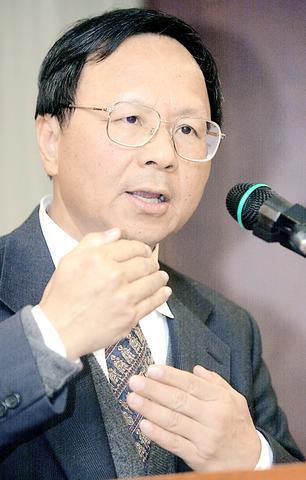As National Palace Museum Director Tu Cheng-sheng (
After obtaining a bachelor's degree and a master's degree at National Taiwan University, Tu studied at the London School of Economics, but he later gave it up after deciding to probe into Chinese and Taiwanese history. As soon as he came back to Taiwan in 1980, Tu worked as a researcher at the Institute of History and Philology at Academia Sinica and served as the Institute's director from 1995 to 2000.

FILE PHOTO: LIBERTY TIMES
With a specialty in ancient China, Chinese social history and medical history, Tu, 60, is also noted for his activism and dedication to history education.
After becoming the director of the National Palace Museum in 2000, Tu focused on making the museum more accessible to domestic and international communities. Last January, Tu organized a special exhibition "the Emergence of Taiwan on the World Scene in the 17th Century," which attracted a large number of visitors.
Tu was also devoted to establishing a branch of the National Palace Museum in Chiayi County and helped arrange the museum's collection for display in Germany when first lady Wu Shu-chen (
Except his performance as a curator, Tu is known for serving as the committee convener for compiling the junior-high school textbook series named Knowing Taiwan (認識台灣) in 1996, which focused on teaching young students about the different historic, geographic and social aspects of Taiwan.
However, some pro-unification academics and legislators said the textbooks were an attempt to "sever the nation," and have vehemently opposed the use of the textbooks, forcing them to be integrated into other courses as supplementary reading matter.
But the controversy over Knowing Taiwan was later considered to be part of the first trend of promoting the Taiwanese identity under former president Lee Teng-hui (
Although he is an authority on Chinese history, Tu has studied Taiwanese history and has proposed a theory called "the Concentric Circle," which stresses teaching young students about Taiwanese history first, and then learn about Chinese history and modern history.
"The ethnic groups and lifestyles in Taiwan are diverse and cultures in Taiwan are thus diverse, too," Tu said in a speech on March 21. "We are supposed to look at our history on a basis that Taiwan is an principal part and establish a historical perspective with diverse angles and concerns."
"I encourage students to know history from the things closest and most familiar to them and explore it more and more broadly," Tu said.
The Ministry of Education planned to apply Tu's "theory of concentric circle" as the new guidelines for high school history textbooks last October but it was again boycotted by People First Party (PFP) Legislator Lee Ching-hua (
Many critics commented that Tu is a learned and hardworking researcher but also quite firm on what he thinks right.
Cheng Pang-chen (
"I think Tu is a scholar who handles public speaking very well and has a very broad historical mind. I have high expectations for his performance," Cheng said.

An essay competition jointly organized by a local writing society and a publisher affiliated with the Chinese Communist Party (CCP) might have contravened the Act Governing Relations Between the People of the Taiwan Area and the Mainland Area (臺灣地區與大陸地區人民關係條例), the Mainland Affairs Council (MAC) said on Thursday. “In this case, the partner organization is clearly an agency under the CCP’s Fujian Provincial Committee,” MAC Deputy Minister and spokesperson Liang Wen-chieh (梁文傑) said at a news briefing in Taipei. “It also involves bringing Taiwanese students to China with all-expenses-paid arrangements to attend award ceremonies and camps,” Liang said. Those two “characteristics” are typically sufficient

A magnitude 5.9 earthquake that struck about 33km off the coast of Hualien City was the "main shock" in a series of quakes in the area, with aftershocks expected over the next three days, the Central Weather Administration (CWA) said yesterday. Prior to the magnitude 5.9 quake shaking most of Taiwan at 6:53pm yesterday, six other earthquakes stronger than a magnitude of 4, starting with a magnitude 5.5 quake at 6:09pm, occurred in the area. CWA Seismological Center Director Wu Chien-fu (吳健富) confirmed that the quakes were all part of the same series and that the magnitude 5.5 temblor was

The brilliant blue waters, thick foliage and bucolic atmosphere on this seemingly idyllic archipelago deep in the Pacific Ocean belie the key role it now plays in a titanic geopolitical struggle. Palau is again on the front line as China, and the US and its allies prepare their forces in an intensifying contest for control over the Asia-Pacific region. The democratic nation of just 17,000 people hosts US-controlled airstrips and soon-to-be-completed radar installations that the US military describes as “critical” to monitoring vast swathes of water and airspace. It is also a key piece of the second island chain, a string of

The Central Weather Administration has issued a heat alert for southeastern Taiwan, warning of temperatures as high as 36°C today, while alerting some coastal areas of strong winds later in the day. Kaohsiung’s Neimen District (內門) and Pingtung County’s Neipu Township (內埔) are under an orange heat alert, which warns of temperatures as high as 36°C for three consecutive days, the CWA said, citing southwest winds. The heat would also extend to Tainan’s Nansi (楠西) and Yujing (玉井) districts, as well as Pingtung’s Gaoshu (高樹), Yanpu (鹽埔) and Majia (瑪家) townships, it said, forecasting highs of up to 36°C in those areas